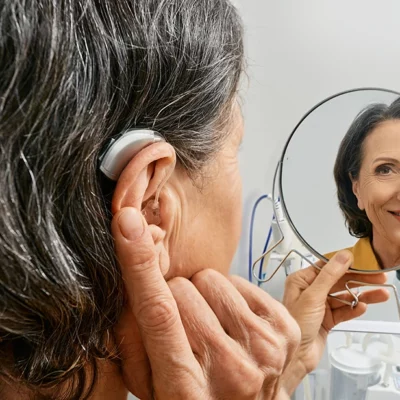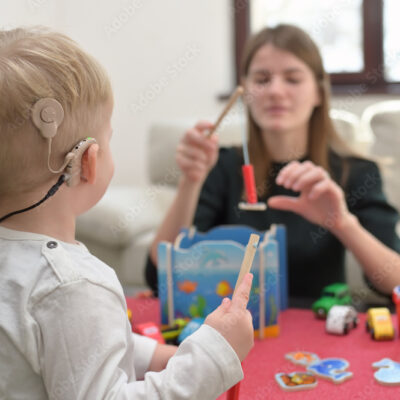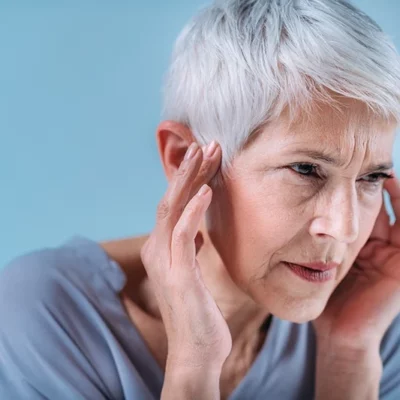OVERVIEW OF CURRENT TINNITUS THERAPIES
Chronic tinnitus cannot simply be “switched off”. However, those affected can learn to reevaluate it. They then no longer perceive it so intensely and the negative, tinnitus-related thoughts and feelings decrease.
The most important pillar of any therapy is individual counseling and psychoeducational education (counseling). Patients can take advantage of this offer during the entire therapy period. They are shown what causes, circumstances and interconnections lead to tinnitus and, if applicable, its amplification. Only with this understanding and knowledge can they re-evaluate their own situation, reduce fears, reduce the pressure of suffering – and thus lay the foundation for further action.
Tinnitus treatment does not promise a cure. However, it can help to significantly improve the quality of life of patients. One success factor is that those affected are no longer passive sufferers, but can actively contribute to their own recovery or health improvement. But what sounds so simple requires not only great commitment, but above all a great deal of insight and even more patience: Usually, tinnitus therapy lasts twelve to 24 months. In any case, success is a team effort in which physicians, psychologists, physiotherapists, orthopedists, neurologists and hearing aid acousticians work together in an interdisciplinary manner – always actively supported by the patient himself. The goal is to get used to the tinnitus (habituation) and to control it in everyday life. Fortunately, this displacement from consciousness works regardless of the possible cause.
In the following, we present some therapies that have been classified as effective treatments for tinnitus according to the S3 Guideline Chronic Tinnitus, published by the German Society of Otolaryngology, Head and Neck Surgery, September 2021. Guideline coordination in 2019 was the responsibility of Prof. Dr. Birgit Mazurek, Chair of the Foundation’s Board of Directors, and Prof. Dr. Gerhard Hesse, member of the Scientific Advisory Board.


No two tinnitus are alike. Therefore, a suitable therapy path must be found for each affected person. The aim of every treatment is to ensure that patients do not perceive annoying noises at all, or that they no longer perceive them so strongly and annoyingly. In this context, specialists speak of the “decoupling of unwanted signals”. In the chronic stage, however, this uncoupling cannot yet be brought about by pharmacological intervention. Rather, a holistic approach is required, which calls for a high level of therapeutic expertise on the part of those treating the patient.
Recognized, psycho-physiological therapy methods for chronic tinnitus are used on an outpatient and inpatient basis. The prerequisite, however, is that the patients are open enough to engage with the model underlying these therapies and cooperate on an ongoing basis.
Stress, inner tension, hidden conflicts, partnership problems and depressive moods are often accompanying symptoms or sometimes even causal reasons for the “vicious circle of tinnitus”. The active psychological individual or group discussion makes it possible to uncover correlations, recognize stress-reinforcing habits, identify noise-related fears and develop personal coping strategies based on these.
Source:
Deutsche Gesellschaft f. Hals-Nasen-Ohren-Heilkunde, Kopf- und Hals-Chirurgie e. V. (ed.), S 3-Leitlinie Chronischer Tinnitus, AWMF-Register-Nr. 017/064, Sept. 2021,, p. 26 ff.: https://register.awmf.org/de/leitlinien/detail/017-064

Chronic tinnitus is often accompanied by hearing loss. A promising treatment option in these cases is the use of hearing aids. Recent studies show good effects also in isolated high-frequency loss and high-frequency tinnitus.
These can help reduce tinnitus severity by compensating for hearing loss and reducing the perception of environmental sounds, which can improve hearing performance again and push tinnitus into the background.
In any case, it is important that the hearing aids are fitted correctly by a qualified hearing care professional or audiologist.
Sources:
1 Deutsche Gesellschaft für Hals-Nasen-Ohren-Heilkunde, Kopf- und Hals-Chirurgie e. V. (ed.), S 3-Leitlinie Chronischer Tinnitus, AWMF-Register-Nr. 017/064, Sept. 2021,, p. 18 ff.: https://register.awmf.org/de/leitlinien/detail/017-064
2 Yakunina, N., et al, Tinnitus Suppression Effect of Hearing Aids in Patients With High-frequency Hearing Loss: A Randomized Double-blind Controlled Trial. Otology & Neurotology, 40(7), Aug. 2019, pp. 865-871: https://doi.org/10.1097/mao.0000000000002315


For profoundly deaf and hard of hearing, even unilaterally deafened people with chronic tinnitus, treatment with cochlear implants can bring improvement. Cochlear implants are electronic devices that directly stimulate the auditory nerve to restore hearing.
A study published in the journal Otology & Neurotology (see source 2) examined the effectiveness of cochlear implants in tinnitus patients with severe hearing loss. Results showed a significant reduction in tinnitus severity and improvement in hearing performance and quality of life among participants.
The positive effect of a cochlear implant on tinnitus seems to be independent of age, i.e. even patients over 80 years of age can benefit from CI implantation for tinnitus and hearing loss.
However, cochlear implants are not suitable for everyone. Implantation requires surgery and may be associated with risks and complications. They can also be expensive and are not fully covered by many insurance policies.
If you suffer from tinnitus and hearing loss, talk to your doctor about the possibility of cochlear implantation.
Sources:
1 Deutsche Gesellschaft für Hals-Nasen-Ohren-Heilkunde, Kopf- und Hals-Chirurgie e. V. (ed.), S 3-Leitlinie Chronischer Tinnitus, AWMF-Register-Nr. 017/064, Sept. 2021, p. 21 ff.: https://register.awmf.org/de/leitlinien/detail/017-064
2 Yuen, Erick; Ma, Cheng; Nguyen, Shaun A.; Meyer, Ted A.; Lambert, Paul R., The Effect of Cochlear Implantation on Tinnitus and Quality of Life: A Systematic Review and Meta-analysis, Otology & Neurotology 42(8), Sept. 2021, pp. 1113-1122: https://doi.org/10.1097/mao.0000000000003172

Attention and listening training sensitizes you to the variety of sounds in our environment and teaches strategies for new listening behavior, for example in noise-enriched environments. By learning to stop “listening inwardly” and to turn attentively outward again, annoying noises are no longer perceived as strongly and disturbingly.
Specifically, targeted exercises are used to train central auditory processing skills such as directional hearing, focusing and differentiation in noise with and without hearing aids with the goal of overhearing the tinnitus.
Auditory discrimination training (ADT), which requires tinnitus patients to perform frequency discrimination exercises, also improves tinnitus distress.
Sources:
1 Deutsche Gesellschaft für Hals-Nasen-Ohren-Heilkunde, Kopf- und Hals-Chirurgie e. V. (ed.), S 3-Leitlinie Chronischer Tinnitus, AWMF-Register-Nr. 017/064, Sept. 2021, p. 24 ff.: https://register.awmf.org/de/leitlinien/detail/017-064
2 Hoare, D.; P. Stacey; D. Hall, The Efficacy of Auditory Perceptual Training for Tinnitus: A Systematic Review, Ann Behav Med, 40(3), Dec. 2010, pp. 313-324: https://doi.org/10.1007%2Fs12160-010-9213-5
3 Hesse, G.; H. Schaaf, Manual der Hörtherapie, 2012, Stuttgart, Thieme: https://eref.thieme.de/ebooks/1112960#/ebook_1112960_SL45948282

Relaxation techniques are an integral part of tinnitus therapy. They help with stress management and make it easier to come to terms with one’s own situation: patients become fit(ter) for the stresses of everyday life, the tinnitus-reinforcing, somatic tension cycles decrease and their lives regain quality.
Patients with chronic tinnitus should undergo manual medical and physiotherapeutic therapy if they have been diagnosed with modulations of the tinnitus caused by changes in the cervical spine or the masticatory apparatus.
Source:
German Society of Otorhinolaryngology, Head and Neck Surgery (ed.), S 3 Guideline Chronic Tinnitus, AWMF Register No. 017/064, Sept. 2021, P. 59/60: https://register.awmf.org/de/leitlinien/detail/017-064


Self-help is an important part of managing chronic tinnitus. However, it should not stand alone, but rather be perceived as an accompaniment to a holistically oriented therapy.
It is important to note: tinnitus can quickly lead to social isolation and severely affect the lives of those affected. Support through contact and exchange of experiences with other sufferers in a self-help group, with friends or family helps to counteract this.
Self-help meetings are offered in presence and increasingly also as digital discussion groups.